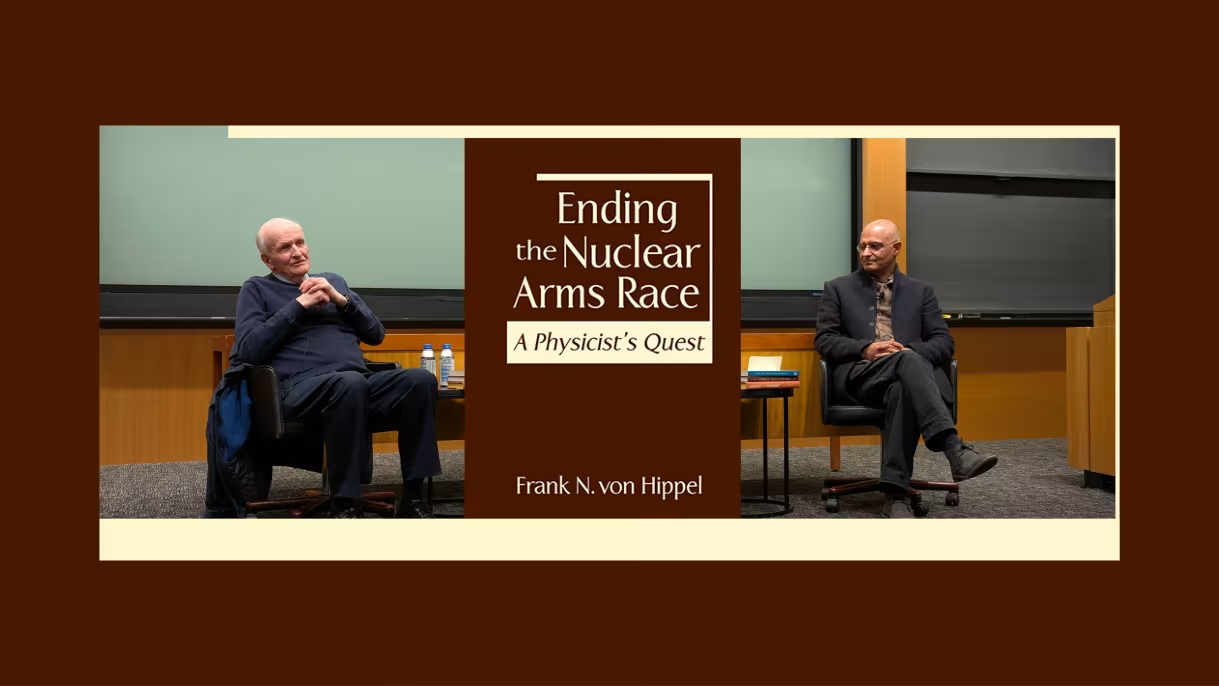

Princeton SPIA Pioneer Reflects on 50 Years of Anti-Nuclear Efforts
At 87, Frank von Hippel — the first natural scientist to be hired by the Princeton School of Public and International Affairs more than 40 years ago — has written down his life story.
“Ending the Nuclear Arms Race: A Physicist’s Quest” explains how von Hippel, a third-generation physicist and the first in his family to be born in the United States, co-founded the Program on Science and Global Security (SGS) at Princeton SPIA and played a pivotal role in nuclear disarmament efforts during the Cold War.
In the preface of his book, von Hippel bills it as “a memoir of my adventures as a physicist in the policy arena.”
“Basically, I wrote it for my friends and family. My father wrote a memoir, and the grandchildren really found it interesting,” von Hippel said in an interview. “I think it’s a way to stay alive in a way, in people’s memories.”
The book comes on the heels of an honor that holds special meaning for him. Earlier this year, von Hippel — whose parents left Germany in 1933 after Adolf Hitler came into power — became the first non-German to win the Göttinger Friedenspreis (Göttingen Peace Prize) from the Dr. Roland Röhl Foundation for “outstanding contributions to scientific peace research and his significant peace-building activities in the field of nuclear arms control and disarmament and non-proliferation” and for his “exceptional service and tireless commitment to peace and security.”
Von Hippel, professor emeritus of public and international affairs at the School, taught an undergraduate policy task force as recently as 2023 and graduate policy workshops between 2005 and 2012. Since joining the faculty in 1984, he has taught hundreds of Princeton SPIA students.
“I can say without hesitation that my entire career path was shaped by Frank von Hippel. Before I took his policy workshop co-taught by Robert Einhorn MPA ’71, I knew relatively little about nuclear issues and nonproliferation,” said Richard Johnson MPA ’06, former deputy assistant secretary of defense for Nuclear and Countering WMD Policy. “I realized that I had a passion for these topics and decided to take a job at the State Department focused on the North Korean nuclear challenge.”
Karen McGuinness, associate dean for graduate education, said, “Frank became a master at leading policy workshops, adept at linking our grad students with senior government officials, scholars, and nongovernmental experts in the field. He helped to nurture and launch some of the next generation of nonproliferation policymakers.”
Von Hippel’s first course was a science and technology policy class he taught to undergraduates, which he did for 15 years. He enjoyed bringing in whistleblower Dan Ellsberg, who leaked the Pentagon Papers, to speak every year.
“I had a pretty expansive definition of science and technology policy,” von Hippel recalled with a laugh.
Alex Glaser, co-director of SGS, has taught a similar course for the past decade, “Science and Global Security.”
“Frank’s accomplishments are impossible to summarize in a few words," Glaser said. “Over the years, he has worked on so many issues that have made this world a better place — and we have learned from him that it's important to be patient and persistent even when facing headwinds and when the ultimate policy outcome can sometimes appear remote.”
Von Hippel also developed a course in the MPA program called “Protection Against Weapons of Mass Destruction.” A similar seminar, “Weapons of Mass Destruction and International Security,” is now taught by Christopher Chyba, the Dwight D. Eisenhower Professor in International Affairs and a professor of astrophysical sciences. It draws a variety of students, including those who are active-duty military, diplomats, and astrophysics, molecular biology, and engineering majors.
“While Frank may have been SPIA’s first natural scientist, now SPIA has built scientists and engineers into two major components of its curriculum — consistent with the challenges of the world we live in,” Chyba said, referring to the School’s Ph.D. program, which has two research clusters: science, technology, and environmental policy (STEP) and security studies.
Beyond teaching, von Hippel played a seminal role in the nuclear arms conversations of his day.
In 1987, he addressed a large gathering of foreign nuclear experts and Soviet leaders, including General Secretary Mikhail Gorbachev, in Moscow. As the chairman of the Federation of American Scientists, von Hippel was part of a group of scientists who laid out a way for both the United States and the USSR to make ten-fold cuts in their nuclear arsenals. He takes only a small part of the credit but notes that the combined U.S.-Russian stocks of nuclear warheads, although still large enough to destroy civilization, are down by 87 percent since 1987.
“Without question,” he said, “it was the greatest moment of impact for me and SGS.”
SGS has continued to build on those efforts.
With China building up its nuclear forces today and the U.S. facing growing political pressure to do the same, von Hippel applauded his successors for leading the Physicists Coalition for Nuclear Threat Reduction and the scientific advisory committee to the 73 countries that have joined the United Nations Treaty on the Prohibition of Nuclear Weapons.
“SGS has had a greater impact on nuclear-weapon policy over the past 50 years than any other academic program worldwide,” he said.

